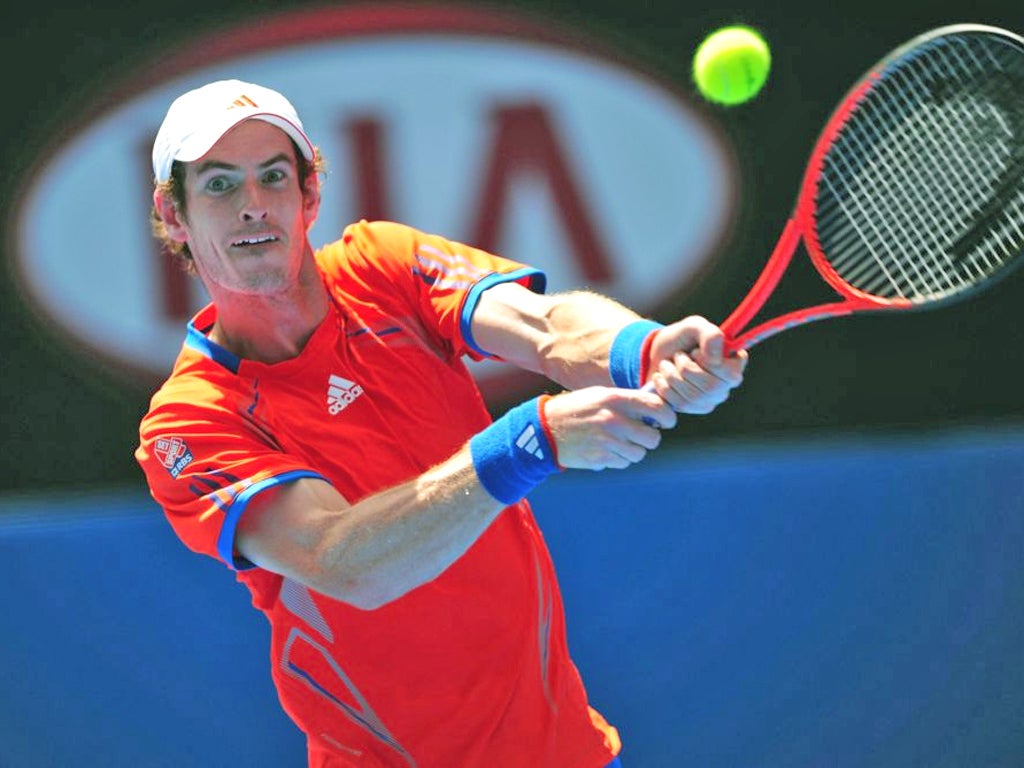James Lawton: Can this new Murray lead to major prizes?

These may be extremely early days in the remaking of Andy Murray at the rather advanced age of 24 going on 25, but whatever happens at the Australian Open his new coach Ivan Lendl deserves applause for one achievement at least.
It is to get his ageing protégé – we are talking about tennis, the ultimate game of precocious champions, after all – through a whole round of a Grand Slam tournament without a single anguished entreaty to his mother or some other member of his entourage.
This may not be unchallengeable evidence the Murray breakthrough is now fixed in the stars but Lendl had to start somewhere. Barring some emotional recidivism by Murray in this morning's collision with the obscure and mild-mannered Frenchman Edouard Roger- Vasselin, Lendl, a serial Grand Slam winner in his time, has surely found the most important place to do so.
It is in the so often disconcertingly fragile psyche of an otherwise enviably gifted performer. Lendl has told Murray that he should, competitively speaking, grow up.
If putting it this way sounds like a gratuitous insult to an intelligent, humorous, frequently ironic and extremely rich young man, we should perhaps remind ourselves of quite what happened in Melbourne this time last year.
It was when some hard judges like John McEnroe and Boris Becker were obliged to register serious doubt that Murray, by far the most talented British player since the all-conquering Fred Perry, would ever deliver a winning Grand Slam campaign.
There was, of course, no rush to the betting window to support him in the final against a Novak Djokovic hitting extraordinary levels of consistent rampage. However, what no one could have anticipated was quite the degree of Serbian mastery. It was the product of competition between man and boy.
Murray parodied the excesses of previous court behaviour. Some feared he had, finally, burnt himself up as a serious challenger to the axis of Djokovic, Rafael Nadal and the resilient Roger Federer. It was, by some distance, his feeblest attempt to win a Grand Slam final.
Inevitably, he produced moments of brilliance, especially at the encouraging point of the first set, but they came out of a game plan that, compared to the thrilling aggression of Djokovic, became progressively the last word in passivity.
When the Serb suffered a reverse his eyes narrowed and he dug a little deeper. When the same thing happened to Murray he lurched into some long, rambling monologue and all the familiar body language of rage and despair.
It is true that this behaviour mirrored that of the young, conquering McEnroe, but with the crucial difference that the worst affected player was invariably standing on the other side of the net. Murray, more relentlessly than ever before, simply destroyed himself.
A leading sports psychologist once offered the theory that McEnroe needed to provoke himself into heights of emotion and anger because it was his best means of motivation. Otherwise, he might not have cared enough. It seems that for Murray the reverse has always been true.
For him, certainly, Melbourne last year was the start of a long, tormenting road – not least at Wimbledon where in their semi-final Nadal seemed briefly vulnerable before Murray missed the most inviting smash – and now at the end of it we find the stern Lendl.
Even while winning eight Grand Slam events, and missing the Wimbledon title by the barest margins, Lendl had many days which rivalled Murray's introspection. But he was always relentless about the need to focus on his own performance and preparation and in Melbourne this week perhaps the most encouraging sounds have been of his charge echoing such a priority.
None of this impinges on the reality that the odds against Murray winning a Grand Slam remain formidable. Before he lost to Nadal at Wimbledon, former champion Richard Krajicek explained his moment of glory in 1996 came when Pete Sampras was taken out of the equation. It was not a time when three men held the game in such a vice; if one goes down, another is standing in his place and the prospect is quite as daunting.
"Murray is an extremely talented player," said Krajicek, "and in another era you would say it was more or less inevitable that he won a Grand Slam but not now. Not with Nadal and Djokovic taking over from Federer – and, don't forget, another generation is going to announce itself one day soon."
Ryan Harrison, a gifted young American who has elected himself to that promising company, took a set off Murray this week and provoked concern he might be about to blow once again. But Murray held on to his game and some vital composure. He did not browbeat the unfortunate occupants of the seats allotted to his people. For the moment, that makes it advantage Lendl.
Subscribe to Independent Premium to bookmark this article
Want to bookmark your favourite articles and stories to read or reference later? Start your Independent Premium subscription today.

Join our commenting forum
Join thought-provoking conversations, follow other Independent readers and see their replies